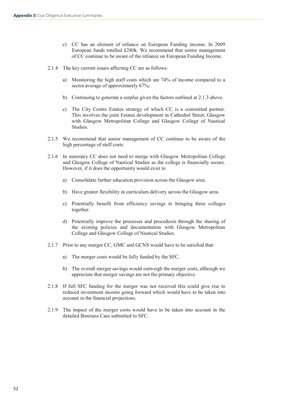
c) CC has an element of reliance on European Funding income. In 2009
European funds totalled £280k. We recommend that senior management
of CC continue to be aware of the reliance on European Funding Income.
2.1.4 The key current issues affecting CC are as follows:
a) Monitoring the high staff costs which are 74% of income compared to a
sector average of approximately 67%;
b) Continuing to generate a surplus given the factors outlined at 2.1.3 above.
c) The City Centre Estates strategy of which CC is a committed partner.
This involves the joint Estates development in Cathedral Street, Glasgow
with Glasgow Metropolitan College and Glasgow College of Nautical
Studies.
2.1.5 We recommend that senior management of CC continue to be aware of the
high percentage of staff costs.
2.1.6 In summary CC does not need to merge with Glasgow Metropolitan College
and Glasgow College of Nautical Studies as the college is financially secure.
However, if it does the opportunity would exist to
a) Consolidate further education provision across the Glasgow area.
b) Have greater flexibility in curriculum delivery across the Glasgow area.
c) Potentially benefit from efficiency savings in bringing three colleges
together.
d) Potentially improve the processes and procedures through the sharing of
the existing policies and documentation with Glasgow Metropolitan
College and Glasgow College of Nautical Studies.
2.1.7 Prior to any merger CC, GMC and GCNS would have to be satisfied that:
a) The merger costs would be fully funded by the SFC.
b) The overall merger savings would outweigh the merger costs, although we
appreciate that merger savings are not the primary objective.
2.1.8 If full SFC funding for the merger was not received this could give rise to
reduced investment income going forward which would have to be taken into
account in the financial projections.
2.1.9 The impact of the merger costs would have to be taken into account in the
detailed Business Case submitted to SFC.
Appendix 5: Due Diligence Executive Summaries
52